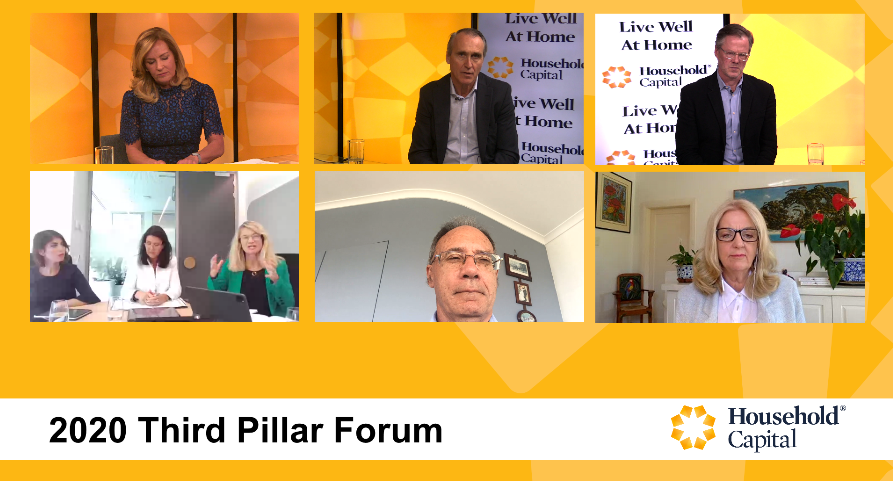
Household Capital 2020 Third Pillar Forum

Household Capital’s 2020 Third Pillar Forum launched today as an online experience hosted at householdcapital.com.au/third-pillar-forum. The online forum includes a live panel discussion and interviews with 27 experts from around the world.
The Forum’s live national panel debate was hosted by Ali Moore in the Melbourne studio with Andrew Boal, CEO of Rice Warner and Joshua Funder, CEO of Household Capital. Senator the Hon Jane Hume, Assistant Minister for Superannuation, Financial Services and Financial Technology, along with Aware Super CEO Deanne Stewart and Milliman’s Amara Haqqani joined from the Aware Super Sydney office. Peter Harris, former Chairman of the Productivity Commission and author Jean Kitson joined respectively from Queensland and New South Wales.
The robust conversation covered the three pillars of retirement funding: the government pension, superannuation and voluntary savings including home equity. The panel also addressed wider topical concerns around aged care, the significant disparity between the sexes in retirement wealth, the need for education and engagement, as well as focussing into specific action points such as proposed increases to the standard employer contribution of 9.5 percent, or including the home in the asset test.
Senator Hume said, “The concept of the third pillar is actually really important, the importance of that third pillar in providing for retirement has been really overlooked I think in the policy conversation about retirement so far. And a third pillar, or voluntary savings, is incredibly important to the retirement security of Australians. For many, as we know, the family home is possibly the most significant form of voluntary savings that retirees have historically had, because retirees have historically had a very high level of home ownership compared to other countries, in Australia. However, the family home is not actually considered a part of a person’s retirement income.”
Dr Joshua Funder, Chief Executive Officer of Household Capital said, “Home isn’t just a source of funding, it’s not just a house. It’s your identity, it’s your family, it’s your community, it’s housing, and it’s a source of funding.” Advocating for the need for change, Funder said, “Older Australians are some of the wealthiest in the world, they live longer than ever and yet they are worried.”
Key topics
The key topics discussed by the lively panel included the three pillars, aged care, women in old aged poverty, education and engagement.
The three pillars
The live panel provided a unique opportunity to cohesively focus on all the three pillars of retirement funding: the age care pension, superannuation and home equity.
The funding amount is significant. “There’s a trillion dollars in home equity owned by Australian retirees – using this responsibly for long-term funding can improve retirement,” said Funder.
Senator Jane Hume said, “Ultimately what we need to be thinking about is the interaction of all three pillars of the system: the aged pension, superannuation and the third pillar, and how they work together to deliver for Australians in retirement.”
Deanne Stewart, CEO, Aware Super said, “Threading the needle between pillars one, two and three needs good quality and affordable advice. This results in confidence and good mental health in retirement.”
Aged care
Aged care is a major concern of every Australian, with the Royal Commission and COVID bringing it sharply into focus and later aged care being of particular importance.
Jean Kitson, author of Let’s Talk About Mum and Dad said, “I found there was a lot of fear about aging and aged care and especially the capacity to pay for your care. I think that fear, it also comes out of that narrative, that older Australians are a burden. That has been a terrible narrative and it sets up a conflict between older Australians and people who are making financial policy and economists. That puts everyone in a defensive mode.
“My parents are pensioners and they manage, they don’t imagine. They have lives, not lifestyles.”
Andrew Boal, CEO, Rice Warner pointed to the escalating costs in later life. “We’re living longer but only about half of that is healthy. After age 82, nearly 50 percent have health issues,” he said. “The cost of health care after age 85 is about five times higher than the cost of healthcare for a 35 year old. And then you’ve got aged care. Am I going to need it? To what extent? I don’t know. So I’m going to have to reserve a whole lot of capital just for those things just in case.”
Women in old aged poverty
The levels of poverty of women in retirement were of concern to all members of the panel.
Deanne Stewart, CEO of Aware Super said, “Two thirds of our members are female. We see a real disparity between males and females. Females are retiring on 57 percent of their male counterparts. One in three women get to retirement without superannuation.”
Kitson empathised, “It’s women on their own, mostly women on their own, on one pension and renting. They’re the ones in a lot of strife and who really struggle.”
Stewart explained the reasons behind the lower fund balances. “About one third of it is the career breaks. Taking time out, maternity leave, looking after elderly parents. About two thirds of it is due to wage differences. Women tend to work more part time, and that gender pay gap. Underneath that data is not just about women, but those with very low income. And those that are more casualized or part-time, or in the gig economy.”
Funder spoke to the broader issue of supporting all older Australians, including women, to have a dignified old age. “Many Australians, particularly single retired Australians, particularly single female retired Australians have only one pillar and it’s the pension and where those Australians are in the private rental market, they’re amongst the poorest and most vulnerable of Australians. So, that’s not a question about three pillars, that’s a question about helping those people live with dignity throughout their lives. We all need to come together and agree on a whole range of help that’s needed to make sure those aged Australians aren’t vulnerable, poor and can live with dignity.”
Education and engagement
The panel all spoke to the importance of education and engagement to increase knowledge and confidence. This becomes increasingly challenging as customers age.
“What we really want is people to be more engaged in their superannuation and more engaged, including their superannuation as part of their personal balance sheet,” said Senator Hume.
Amara Haqqani, Director, Milliman asked, “What processes and policies can we put in place to encourage engagement between people and their retirement funding? We need to be better at providing education to retirees.”
Haqqani spoke to the need to be education rather than product focussed. “We talk about guidance, financial guidance, financial counselling. It all comes back to getting the basics right to get people confident. Once you’ve got them understanding their own retirement needs, then you can start looking at products.”
Financial technology may play an important role in making mass information accessible. “We can use technology to help ‘middle Australia’ navigate an appropriate retirement strategy,” said Boal.
Harris spoke strongly for the need for independent expert advice. “We need a form of navigator here, and it has to be a trusted navigator. It’s a person who provides better information in your particular circumstances. We don’t really develop such people for the purposes of aging.”
The benefits will be seen across society. “We need to get retirees confident in their finances and their lifestyle. That will encourage consumption which is good for everyone” said Funder.
Online in 2020
The inaugural Third Pillar Forum was hosted in Melbourne in October 2019.
Dr Joshua Funder, Chief Executive Officer of Household Capital, said, “We were strongly committed to ensuring that the 2020 Third Pillar Forum went ahead. Now more than ever it is essential that the government and the industry seeks solutions that allow older Australians to live safely and securely in their old age.”
As a fintech Household Capital, had been delivering 100 percent digital customer service to older Australians since before lockdown so while the move online was new, it was a natural development.
Funder continues, “We have continued to grow throughout the pandemic, providing support, information and funding for our customers through an online customer experience and through video and telephone support. Delivering the forum online fits with our commitment to provide great content, drive the conversation and build a movement to deliver all three pillars of retirement wealth to older Australians. This year’s format enabled us to invite all our customers as well as industry experts who could join live and ask questions of the panel. Household Capital looks forward to hosting industry events in a more normal future, but following the successful response to this year’s online broadcast element, will continue to ensure widespread access to our content and national conversation.”
The 2020 event was attended by Household Capital customers, industry leaders and media. As well as the live panel, the Third Pillar Forum includes interviews and content from experts and advocates from Australia and around the world.
Join the conversation
Household Capital is committed to keeping this topic alive throughout the year. Join the conversation on Twitter #thirdpillarforum. Visit householdcapital.com.au/third-pillar-forum to watch the live panel discussion as well as to view 27 videos from world leading experts.


